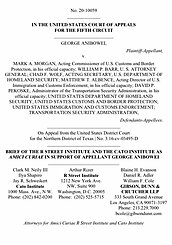The Fourth Amendment to the Constitution is largely a product of the founders’ experience with warrantless searches and seizures in the colonial era. The founders reviled the “general warrants” of their era, allowing British officers to rummage through the houses and belongings of American colonists in an unrestricted search for evidence of criminal wrongdoing. Inspired by two landmark English cases of the time, which held it improper to allow the search and seizure of papers belonging to publishers of a radical newspaper, the founders enshrined in the constitution a fundamental right “to be secure in [ones] persons, houses, papers, and effects, against unreasonable searches and seizure.”
Yet today, that right is under attack. Travelers, even American citizens, crossing the border into the United States are largely stripped of their Fourth Amendment rights and subject to unrestrained searches by border agents. Especially concerning is the federal government’s policy of allowing border agents to search and seize the contents of cell phones and other electronic devices at the border without so much as reasonable suspicion. George Anibowei was subject to one of these searches when he had his cell phone seized at DFW Airport in Dallas, upon returning from a short vacation to Canada. Anibowei, a Nigerian immigrant and licensed lawyer himself, traveled frequently outside the United States, and had been subjected to extensive secondary screening nearly every time he traveled, including four prior cell phone searches by the Department of Homeland Security. While all Americans should be able to travel free from unreasonable searches and seizures, Anibowei’s case is particularly egregious, since his phone contained communications with clients who were adverse to the very agencies that sanctioned the search.
Anibowei challenged the search on the grounds that it violated his Fourth Amendment rights. After an unfavorable ruling in the district court, Anibowei appealed his case to the Fifth Circuit. Cato and the R Street Institute have filed an amicus brief in support of Anibowei, urging the Court to uphold the requirements of the Fourth Amendment. We argue that the federal government’s policy of allowing warrantless searches and seizures of cell phones at the border contravenes the foundational basis for the Fourth Amendment and is inconsistent with existing case law. In the landmark decision Riley v. California, the Supreme Court unanimously upheld the requirement that a warrant be issued prior to searching or seizing one’s cell phone. As the court held in Riley, the ubiquity of cell phones in our modern society, coupled with their seemingly limitless capacity for storage, mark them as a particular area for Fourth Amendment concern, as their contents can reveal the sum of an individual’s private life.
Moreover, neither Congress nor the Supreme Court have ever sanctioned the suspicionless search or seizure of private papers at the border. The Court’s carve‐outs for warrantless searches at the border are limited to cases where there is reasonable suspicion that one possesses contraband or is attempting to circumvent duties. Since the twin governmental interests supporting the border‐search exception are absent in Anibowei’s case, that search violated his Fourth Amendment rights. Holding otherwise would entirely untether the Court’s exception from its given justifications. Allowing suspicionless cell phone searches would empower border patrol to use border searches to gather evidence for general law‐enforcement purposes, and courts have explicitly rejected suspicionless searches for routine evidence gathering. As the Ninth Circuit held in United States v. Bulacan, “courts must guard against the ‘vast potential for abuse’ that accompanies ‘the power to intrude into the privacy of ordinary citizens’ without a ‘warrant or particularized suspicion.’” The Fourth Amendment may not have the same vitality at the border as in the interior of the country, but it cannot be a dead letter either.

